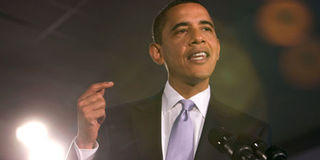Obama visit a reward for Ghana democracy

U.S. President Barack Obama REUTERS
WASHINGTON, Thursday
US President Barack Obama heads next week to Ghana, on the continent where his father was born, for his first trip as president to sub-Saharan Africa.
Africa has not been high on President Obama’s foreign policy agenda in his first six months in office as he wrestles with wars in Iraq and Afghanistan and nuclear standoffs with Iran and North Korea. As an African-American whose father was born in Kenya, President Obama was anxious not to be seen as exaggerating the importance of Africa in US foreign policy.
“He has not yet put his stamp on Africa. His visit to Ghana will be the start,” said Mr Whitney Schneidman, a former Africa policy adviser to Obama during his presidential campaign.
President Obama has been outspoken, however, about the humanitarian crisis in Darfur, and one of his first acts as president was to appoint his friend, General Scott Gration, as his envoy to Sudan. He has also held talks with Zimbabwean Prime Minister Morgan Tsvangirai on the economic crisis in that country.
This will not be his first trip to sub-Saharan Africa. In 2006, he visited Kenya, Chad, Ethiopia, South Africa and Djibouti as a US senator.
Ghana, a former British colony that was the first African nation to win independence in 1957, held a closely contested presidential election which saw power peacefully transferred to opposition leader John Atta Mills in January.
The Obama administration is keen to hold up Ghana as a model for the rest of Africa, where coups are not uncommon and elections are often marred by charges of vote-rigging and sometimes violence.
“Democracy and good governance are high up on his agenda, so he is rewarding Ghana,” said Richard Dowden, director of the Royal African Society in London.
US officials say President Obama will deliver a major speech in the Ghanaian parliament that emphasises good governance and the importance of democratic institutions.
Africa experts say President Obama may use the speech to lay out a more comprehensive vision of his policy on Africa, in particular the importance of dramatically improving food security on a continent where millions are starving. Fighting corruption and expanding Bush administration initiatives to combat the spread of HIV and Aids and malaria also could be featured.
“If President Obama were to come to Kenya as the first country in Africa, it would send some very wrong signals that he is coming here merely because of some organic relationship that he has with this country,” said Kenyan Prime Minister Raila Odinga.
On his radar
President Obama’s single stop in Ghana rather than the multi-country trip US presidents traditionally undertake to Africa has been choreographed to emphasise that the continent is on his radar but it is just one area on a packed foreign policy agenda.
“What he is saying to Africa is, ‘You are important to me, but be patient. I have other things on my plate and our relationship will have to unfold over time,’” said Mr Steven McDonald, the director of the Woodrow Wilson International Centre’s Africa programme in Washington.
Africa has been affected by the global economic crisis with steep rises in fuel, food and fertiliser costs and swings in commodity prices. Falling demand internationally has also reduced demand for African exports.
The Obama administration has said it wants to improve food security in Africa and is focusing on increasing agricultural production to help the continent feed itself.
“We cannot talk about economic growth when we still have a lot of people who are starving,” said Mr Mwangi Kimenyi, a senior fellow at the Brookings Institution in Washington.
Wants to expand
President Obama’s point man for Africa, Assistant Secretary of State Johnnie Carson, says the administration also wants to expand the provisions of the African Growth and Opportunity Act, which currently allows 40 African nations to benefit from preferential access to US markets.
President Obama is also continuing to fund the Millennium Challenge Corporation, a foreign aid initiative launched by the Bush administration. The MCC has signed compacts or grant agreements for $3.8 billion with 10 African countries.
Africa development experts have called on the administration to boost intra-African trade by investing in infrastructure projects to better connect the continent.
Their expectations are more emotional than anything else. The reality -- that President Obama won’t transform or even prioritise Africa -- has hit home. But there will still be immense joy and pride at seeing “one of their own” touch African soil as US president. Ghanaians certainly see it as a big boost for the status of Ghana and are delighted to be hosting him.
Meanwhile, the US Government voiced concern on Wednesday over actions taken by Niger’s President Mamadou Tandja to extend his rule in the West African country.
“These decisions undermine Niger’s efforts over the last 10 years to advance good governance and the rule of law,” White House spokesman Robert Gibbs said in a statement. (Reuters)




